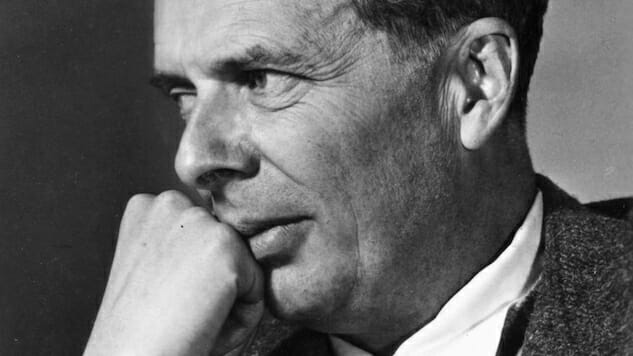The 15 Best Quotes from Brave New World
Photo by Hulton Archive/Getty
A classic dystopian, science-fiction novel by English author Aldous Huxley, Brave New World has become a worldwide literary classic and a mainstay in high school English curriculums since its 1932 release.
Its insidious and disturbing story introduces us to the futuristic World State, in which citizens are genetically modified, molded into a strict social hierarchy, brainwashed into loving their own servitude and forced into a doctored happiness that comes in the form of a government-issued drug. Led by a dictatorial “Controller” named Mustapha Mond, the World State is an unsettling, sinister place endowed with warped visions of an ideal society meant to alienate and disgust readers who value truth, love, beauty and freedom.
Brave New World is stuffed with classic quotes and phrases that rear their heads in essays, papers and other literary works. Here are a few of our favorites.
1. On danger, freedom and sin
“But I don’t want comfort. I want God, I want poetry, I want real danger, I want freedom, I want goodness. I want sin.”
John the Savage incites chaos when he throws out the soma, a government-sponsored drug, at a hospital. When he’s brought before the great Controller Mustapha Mond to answer for his crime, John gets sick of Mond’s talks of being comfortable and responds with this great rallying cry for adventure and nonconformity.
2. On the dullness of happiness
“Actual happiness always looks pretty squalid in comparison with the overcompensations for misery. And, of course, stability isn’t nearly so spectacular as instability. And being contented has none of the glamour of a good fight against misfortune, none of the picturesqueness of a struggle with temptation, or a fatal overthrow by passion or doubt. Happiness is never grand.”
The Controller informs us that while we all chase after happiness and stability, it’s never quite as grand or glamorous as struggle, suffering and instability.
3. On being conditioned to believe
“One believes things because one has been conditioned to believe them.”
In this utopia—er, dystopia—people are brainwashed, or hypnopaedia-ed, from the day they’re born (and born from bottles, at that). Mond argues that people only believe things because they’re told to by some outside force, whether that be hypnopaedia or just societal norms.
4. On remorse
“Chronic remorse, as all the moralists are agreed, is a most undesirable sentiment. If you have behaved badly, repent, make what amends you can and address yourself to the task of behaving better next time. On no account brood over your wrongdoing. Rolling in the muck is not the best way of getting clean.”
Anyone who’s ever made a mistake, which is all of us, knows that guilt is a terrible feeling. Here, in Huxley’s 1946 forward to the novel, we’re reminded not to roll in the muck and dwell in that guilt, but instead to make amends and move on. You have to do more than just be sorry for your mistakes, but there’s also no point in perpetual remorse.
5. On servitude and revolution
“… Most men and women will grow up to love their servitude and will never dream of revolution.”
This quote reminds us of Dostoevsky as Huxley writes that, in the end, people “will lay their freedom at our feet and say to us, ‘make us your slaves but feed us.’” In this society and in ours, people are comfortable handing over freedom to people in power in exchange for safety and stability. In this exchange, people learn to love their servitude, choosing it over any dreams of revolution.
6. On civilization
“I ate civilization. It poisoned me; I was defiled. And then,” he added in a lower tone, “I ate my own wickedness.”
Here, John is struggling to cope with the World State’s lack of humanity and of the traditional values he grew up with. He feels the temptations of his primal urges and the superficial aspects of this society, and reflects on his shame at entering the carefully controlled chaos of this civilization, allowing it to poison and defile him.
-

-

-

-

-

-

-

-

-

-

-

-

-

-

-

-

-

-

-

-

-

-

-

-

-

-

-

-

-

-

-

-

-

-

-

-

-

-

-

-








































